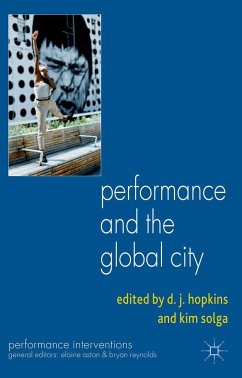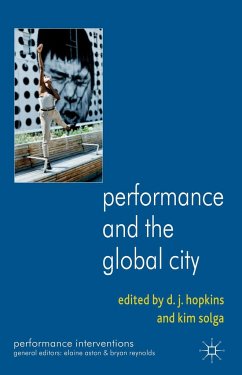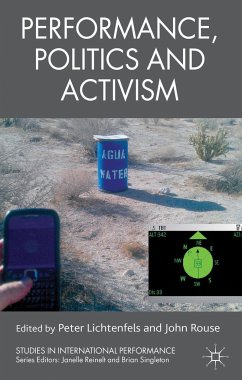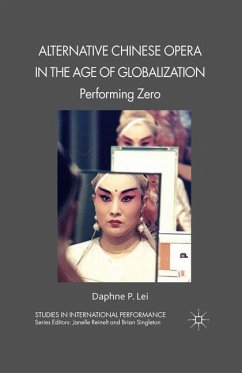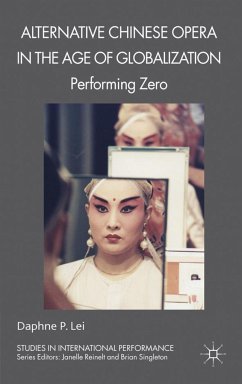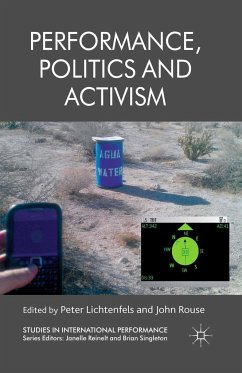
Broschiertes Buch
Performance and the Global City
Versandkostenfrei!
Versandfertig in 6-10 Tagen

PAYBACK Punkte
19 °P sammeln!





Winner of the Association for Theatre in Higher Education Excellence in Editing Award 2016
Following the ground-breaking Performance and the City, this new volume explores what it means to create and experience urban performance - as both an aesthetic and a political practice - in the burgeoning world where cities are built by globalization and neoliberal capital.
Following the ground-breaking Performance and the City, this new volume explores what it means to create and experience urban performance - as both an aesthetic and a political practice - in the burgeoning world where cities are built by globalization and neoliberal capital.
Susan Bennett, University of Calgary, Canada Jason Bush, Stanford University, USA Melissa Butcher, Open University, UK Jennifer H. Capraru, Theatre Asylum, Canada Jean Graham-Jones, City University of New York, USA. Philip Hager, University of Winchester, UK D. J. Hopkins, San Diego State University, USA Nesreen Hussein, University of Kent at Canterbury, UK Silvija Jestrovic, University of Warwick, UK Simon Jones, University of Bristol, UK Loren Kruger, University of Chicago, USA Loren Kruger, University of Chicago, USA Ana Martínez, City University of New York, USA Paul Rae, National University of Singapore, Singapore Kim Solga, Queen Mary University of London, UK Nicolas Whybrow, University of Warwick, UK
Produktdetails
- Performance Interventions
- Verlag: Palgrave Macmillan / Palgrave Macmillan UK / Springer Palgrave Macmillan
- Artikelnr. des Verlages: 978-1-349-34832-9
- 1st ed. 2015
- Seitenzahl: 292
- Erscheinungstermin: 1. Januar 2015
- Englisch
- Abmessung: 216mm x 140mm x 16mm
- Gewicht: 375g
- ISBN-13: 9781349348329
- ISBN-10: 1349348325
- Artikelnr.: 45074669
Herstellerkennzeichnung
Springer-Verlag GmbH
Tiergartenstr. 17
69121 Heidelberg
ProductSafety@springernature.com
"In Performance and the Global City, editors D. J. Hopkins and Kim Solga compile a selection of essays that tackle the complex relationship between spatiality and performance in the global world. ... With a consistently high quality of theoretical rigour and critical analysis, this text offers valuable insights for both geographers and performance studies scholars interested in performance's capacity to contribute to and spur change in urban spaces." (Laine Zisman Newman, Theatre Research International, Vol. 41 (1), 2016)
"The book is divided into three parts, with four essays in each, thematically linked around attention to border zones, bodily movement in the city ... . It is a very coherent structure, which places the
"The book is divided into three parts, with four essays in each, thematically linked around attention to border zones, bodily movement in the city ... . It is a very coherent structure, which places the
Mehr anzeigen
contributions into a productive dialogue with one another. ... make a strong case for the richness of performance practice as an ideal lens through which to consider the politics of place." (Fiona Wilkie, Theatre Journal, Vol. 67, December, 2015)
"This is a book that speaks to our present while also anchoring its many discussions in careful historical, theoretical, and practice-based contexts. Ultimately, then, Performance and the Global City proves well written and accessible, rigorous and substantial, ethical and engaged, and truly global in both reach and impact." (Patrick Lonergan, Contemporary Theatre Review, Vol. 25 (4), 2015)
'Following on from Performance and the City, a well-curated collection of essays exploring performance's role in renegotiating urban space in the industrialized West post-9/11, editors D. J. Hopkins and Kim Solga have published a formidable follow-up. Performance and the Global City builds on its predecessor through a range of essays that explore performance's role in the process of global city mobilization the level of scholarship in Performance and the Global City is consistently high, including further contributions from Melissa Bucher, Philip Hager, Simon Jones and Paul Rae, and the cities covered represent an international cross-section of urban centres.' Performance Research
"This is a book that speaks to our present while also anchoring its many discussions in careful historical, theoretical, and practice-based contexts. Ultimately, then, Performance and the Global City proves well written and accessible, rigorous and substantial, ethical and engaged, and truly global in both reach and impact." (Patrick Lonergan, Contemporary Theatre Review, Vol. 25 (4), 2015)
'Following on from Performance and the City, a well-curated collection of essays exploring performance's role in renegotiating urban space in the industrialized West post-9/11, editors D. J. Hopkins and Kim Solga have published a formidable follow-up. Performance and the Global City builds on its predecessor through a range of essays that explore performance's role in the process of global city mobilization the level of scholarship in Performance and the Global City is consistently high, including further contributions from Melissa Bucher, Philip Hager, Simon Jones and Paul Rae, and the cities covered represent an international cross-section of urban centres.' Performance Research
Schließen
Für dieses Produkt wurde noch keine Bewertung abgegeben. Wir würden uns sehr freuen, wenn du die erste Bewertung schreibst!
Eine Bewertung schreiben
Eine Bewertung schreiben
Andere Kunden interessierten sich für




